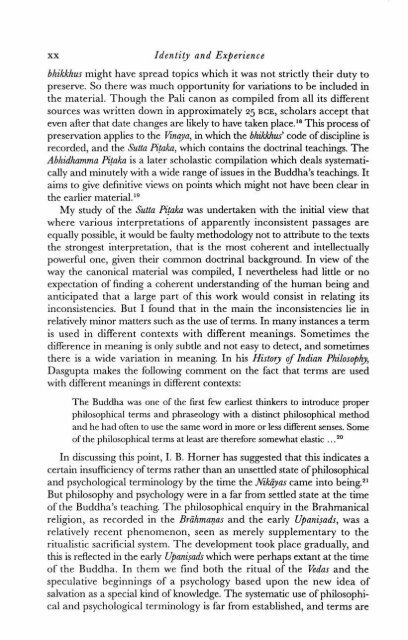Identity and Experience_Hamilton_1996
Identity and Experience_Hamilton_1996
Identity and Experience_Hamilton_1996
Create successful ePaper yourself
Turn your PDF publications into a flip-book with our unique Google optimized e-Paper software.
xx<br />
<strong>Identity</strong> <strong>and</strong> <strong>Experience</strong><br />
bhikkhus might have spread topics which it was not strictly their duty to<br />
preserve. So there was much opportunity for variations to be included in<br />
the material. Though the Pali canon as compiled from all its different<br />
sources was written down in approximately 25 BCE, scholars accept that<br />
even after that date changes are likely to have taken place.'* This process of<br />
preservation applies to the Vinaya, in which the bhiWd2u.s' code of discipline is<br />
recorded, <strong>and</strong> the Sutta Pitaka, which contains the doctrinal teachings. The<br />
Abhidhamma Pi!nka is a later scholastic compilation which deals systematically<br />
<strong>and</strong> minutely with a wide range of issues in the Buddha's teachings. It<br />
aims to give definitive views on points which might not have been clear in<br />
the earlier material. '"<br />
My study of the Sutta PzPztakd was undertaken with the initial view that<br />
where various interpretations of apparently inconsistent passages are<br />
equally possible, it would be faulty methodology not to attribute to the texts<br />
the strongest interpretation, that is the most coherent <strong>and</strong> intellectually<br />
powerful one, given their common doctrinal background. In view of the<br />
way the canonical material was compiled, I nevertheless had little or no<br />
expectation of finding a coherent underst<strong>and</strong>ing of the human being <strong>and</strong><br />
anticipated that a large part of this work would consist in relating its<br />
inconsistencies. But I found that in the main the inconsistencies lie in<br />
relatively minor matters such as the use of terms. In many instances a term<br />
is used in different contexts with different meanings. Sometimes the<br />
difference in meaning is only subtle <strong>and</strong> not easy to detect, <strong>and</strong> sometimes<br />
there is a wide variation in meaning. In his History oflndian Philosophy,<br />
Dasgupta makes the following comment on the fact that terms are used<br />
with different meanings in different contexts:<br />
The Buddha was one of the first few earliest thinkers to introduce proper<br />
philosophical terms <strong>and</strong> phraseology with a distinct philosophical method<br />
<strong>and</strong> he had often to use the same word in more or less different senses. Some<br />
of the philosophical terms at least are therefore somewhat elastic . . .20<br />
In discussing this point, I. B. Horner has suggested that this indicates a<br />
certain insufficiency of terms rather than an unsettled state of philosophical<br />
<strong>and</strong> psychoIogical terminology by the time the Nikoas came into being.21<br />
But philosophy <strong>and</strong> psychology were in a far from settled state at the time<br />
of the Buddha's teaching. The philosophical enquiry in the Brahmanical<br />
religion, as recorded in the Brihmanas <strong>and</strong> the early Upanijads, was a<br />
relatively recent phenomenon, seen as merely supplementary to the<br />
ritualistic sacrificial system. The development took place gradually, <strong>and</strong><br />
this is reflected in the early Upani~adr which were perhaps extant at the time<br />
of the Buddha. In them we find both the ritual of the Edas <strong>and</strong> the<br />
speculative beginnings of a psychology based upon the new idea of<br />
salvation as a special kind of knowledge. The systematic use of philosophical<br />
<strong>and</strong> psychological terminology is far from established, <strong>and</strong> terms are


